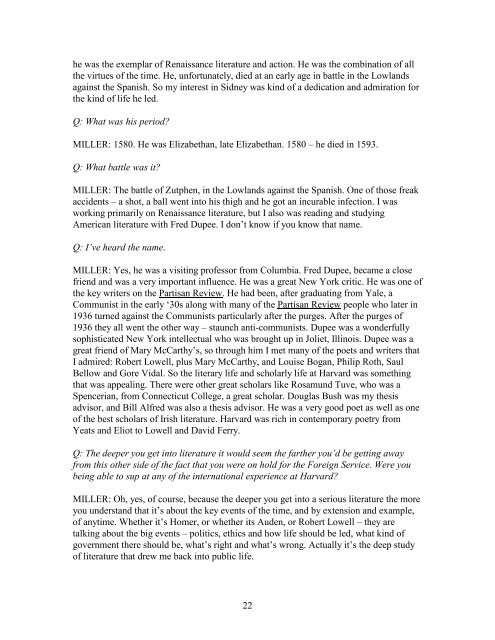1 The Association for Diplomatic Studies and Training Foreign ...
1 The Association for Diplomatic Studies and Training Foreign ...
1 The Association for Diplomatic Studies and Training Foreign ...
You also want an ePaper? Increase the reach of your titles
YUMPU automatically turns print PDFs into web optimized ePapers that Google loves.
he was the exemplar of Renaissance literature <strong>and</strong> action. He was the combination of all<br />
the virtues of the time. He, un<strong>for</strong>tunately, died at an early age in battle in the Lowl<strong>and</strong>s<br />
against the Spanish. So my interest in Sidney was kind of a dedication <strong>and</strong> admiration <strong>for</strong><br />
the kind of life he led.<br />
Q: What was his period?<br />
MILLER: 1580. He was Elizabethan, late Elizabethan. 1580 – he died in 1593.<br />
Q: What battle was it?<br />
MILLER: <strong>The</strong> battle of Zutphen, in the Lowl<strong>and</strong>s against the Spanish. One of those freak<br />
accidents – a shot, a ball went into his thigh <strong>and</strong> he got an incurable infection. I was<br />
working primarily on Renaissance literature, but I also was reading <strong>and</strong> studying<br />
American literature with Fred Dupee. I don’t know if you know that name.<br />
Q: I’ve heard the name.<br />
MILLER: Yes, he was a visiting professor from Columbia. Fred Dupee, became a close<br />
friend <strong>and</strong> was a very important influence. He was a great New York critic. He was one of<br />
the key writers on the Partisan Review. He had been, after graduating from Yale, a<br />
Communist in the early ‘30s along with many of the Partisan Review people who later in<br />
1936 turned against the Communists particularly after the purges. After the purges of<br />
1936 they all went the other way – staunch anti-communists. Dupee was a wonderfully<br />
sophisticated New York intellectual who was brought up in Joliet, Illinois. Dupee was a<br />
great friend of Mary McCarthy’s, so through him I met many of the poets <strong>and</strong> writers that<br />
I admired: Robert Lowell, plus Mary McCarthy, <strong>and</strong> Louise Bogan, Philip Roth, Saul<br />
Bellow <strong>and</strong> Gore Vidal. So the literary life <strong>and</strong> scholarly life at Harvard was something<br />
that was appealing. <strong>The</strong>re were other great scholars like Rosamund Tuve, who was a<br />
Spencerian, from Connecticut College, a great scholar. Douglas Bush was my thesis<br />
advisor, <strong>and</strong> Bill Alfred was also a thesis advisor. He was a very good poet as well as one<br />
of the best scholars of Irish literature. Harvard was rich in contemporary poetry from<br />
Yeats <strong>and</strong> Eliot to Lowell <strong>and</strong> David Ferry.<br />
Q: <strong>The</strong> deeper you get into literature it would seem the farther you’d be getting away<br />
from this other side of the fact that you were on hold <strong>for</strong> the <strong>Foreign</strong> Service. Were you<br />
being able to sup at any of the international experience at Harvard?<br />
MILLER: Oh, yes, of course, because the deeper you get into a serious literature the more<br />
you underst<strong>and</strong> that it’s about the key events of the time, <strong>and</strong> by extension <strong>and</strong> example,<br />
of anytime. Whether it’s Homer, or whether its Auden, or Robert Lowell – they are<br />
talking about the big events – politics, ethics <strong>and</strong> how life should be led, what kind of<br />
government there should be, what’s right <strong>and</strong> what’s wrong. Actually it’s the deep study<br />
of literature that drew me back into public life.<br />
22
















